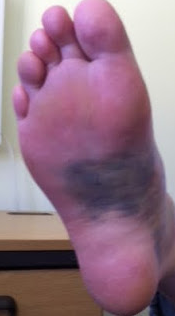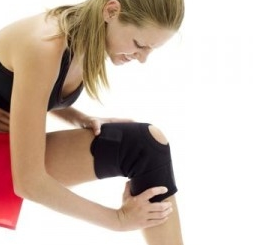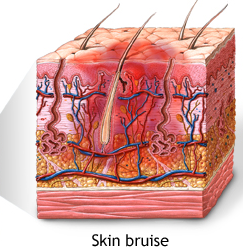Random, unexplained bruising on legs is a problem that some people know only too well. If you are one of them, then you have come to the right place. This article will detail common causes of bruises and highlight the various treatment options
What Causes Random Bruising on Legs?
So you woke up the morning only to find yourself with yet another random set of dark marks that left you wondering, “What causes random bruising on legs?” Well, several causative factors may be to blame for your woes. These are detailed below:

Injury: Bruises appear when small blood vessels (capillaries) close to the surface of the skin get broken as a result of injury, strenuous activities, or from force of impact and leak blood out into the surrounding tissues.
They appear as a dark red, black, or purple discolorations. It might be some days before blood rises close to the surface of the skin and be visible as a bruise. Sometimes the bruise spreads downwards under gravity. It takes 2 to 4 weeks for bruising to heal. During this process, the body reabsorbs the blood which gives rise to a variety of color changes.
Legs and arms are the most common trouble spots in as far as bruising is concerned. Bruised legs typically take longer to heal than other areas of the body such as arms and face.
Frequent Unknown Bruises on Legs
Injury is an obvious cause of bruises, but what about those bruises that appear on your legs without any known causes of injury? Well, causes for frequent and unknown bruising on legs range from underlying medical conditions to lifestyle factors including:
Aging: Bruising on legs is often a consequence of the natural aging process. Older adults tend to bruise more easily than their younger counterparts. Even a minor injury is enough to cause them significant bruising, especially those sustained to the legs, arms, feet and forearms.
This is because as the body ages, the skin become thinner and less flexible due to loss of fat from beneath the skin and decreased production of collagen. As fats decrease, their cushioning effect to blood capillaries also decline.
This coupled with the skin damage from lower collagen production and longtime exposure to the sun makes blood vessels particularly vulnerable to ruptures which culminate in bruising.
Medications: Aspirin and other blood thinning medications such as warfarin and clopidogrel reduce the ability of blood to clot by impairing the function of platelets. Consequently, any damaged capillaries take longer than usual time bleeding.This allows enough blood to leak out of the capillaries, ultimately resulting in a bruise.
Some dietary supplements e.g. as ginkgo and fish oil have also been shown to have a similar effect. Corticosteroids may also be to blame for thinning of skin which then makes it more susceptible to bruising. These includes the drugs used to treat conditions such as asthma, eczema, and allergies.
Vitamin deficiency: Vitamins serve the role of co-factors in numerous body processes and having inadequate quantities of vitamins B12, C, and K can make blood vessels, particularly capillaries, weak leading to easy bruising.

UV damage: The UV radiation emitted by the sun damages skin and often causes sunburn and other related problems such as dark spots, fine lines and wrinkles. That is not all though; the damages sustained to the skin and blood vessel is often a precursor to frequent, easy and unknown bruising, so to speak.
Itching and Bruising on Legs
Itching and bruising on legs or any other part of the body may be a sign of a serious liver problem called primary biliary cirrhosis, commonly abbreviated as PBC.
This is an autoimmune problem that is marked by chronic inflammation and ultimately scarring of the bile ducts within the liver. The exact cause of the condition is unknownbut scientists have ruled out diet and alcohol as potential triggers. Women are 10 times more prone to develop the condition than men.
PBC tend to appear more between the age of 35 and 60 years and while there is no cure, several measures can be undertaken to slow down its progression and relieve the symptoms.
In addition to itching and easy bruising, other symptoms associated with the condition are jaundice, skin pigmentation, indigestion, fatigue, and weight loss.
If you have itching that is accompanied by bruising on legs, your best course of action is to see your doctor proper diagnosis and treatment.
Leukemia Bruising on Lower Legs
Leukemia (cancer of the blood cells) is yet another common cause of sudden, unexplained bruising.
This is a blood disorder that begins in the bone marrow when normal development of stem cells into white blood cells. This goes on until the abnormal white blood cells overtake red blood cells (which transport oxygen to the body) and platelets (which aid in clotting of blood).
Common symptoms of leukemia include excessive bleeding, frequent infections, and easy bruising of the limbs, including legs.
Bruised Vein in Leg and Blood Clot
A bruised vein leg coupled with a blood clot – as one of our readers describe his symptoms in comments section of another related article – may be an indication of a condition known as superficial thrombophlebitis.

This occurs after a superficial vein (commonly the long saphenous vein in the leg or one of its branches gets inflamed and the blood within it clots. This can result from injuries to blood vessels due to trauma or infection.
People who smoke tobacco and those with obesity or thrombophilia are at an especially higher risk of developing this condition. The condition is also associated with other conditions such as varicose veins but it can as well occur spontaneously.
Waking Up With Bruises on Legs
“I don’t know if my diet is the problem or what, but I woke up this morning and noticed random bruises all over my legs, but they are most notable on the calves. I am really confused because I didn’t injure myself at the football game yesterday; about that I am sure. What could be going on? Someone told me it could from vitamin deficiency. What is your take?” Thomas
Well, judging from your involvement in football, the natural ageing process is very likely not to blame for your bruising.
If you are taking some medications such as aspirin or ibuprofen, they could be to blame for the unusual bruises on legs. Deficiency in vitamin C, K, or B12 could as well be the underlying cause. It might be a good idea to incorporate foods rich in these vitamins in your diet.
Just apply cold compresses (ice pack wrapped in a towel) on the bruises for two days and apply warm compresses (towel soaked in warm water) thereafter while taking acetaminophen (if necessary to relieve pain) and keeping the leg elevated. If the bruising takes more than 2 weeks to improve, seems to get worse, or keeps recurring for no apparent reason, talk to your doctor.
It might be a sign of an underlying condition such as diabetes, leukemia, etc.
Large Red Bruises on Leg without Injury
“Lately I seem to be getting bruises for no apparent reason. I get these uglyblue-black discolorations even when I have not sustained any injury at all. Is it something I should be concerned with or even see my doctor about? I am 65 and in excellent health.”
At 65 years of age, it is likely that the natural ageing process is taking toil on your skin leading to the bruising. It could also be the result of long time exposure to sun’s UV radiation, especially if you have been engaging in an outdoor occupation and/or activities.
If you have been taking some blood-thinning medications such as aspirin, corticosteroids (e.g. prednisone), and warfarin, then they could as well be the culprits. You should go back to your doctor and talk with him/her about it.
Lastly, this could be the result of medical conditions such as diabetes, leukemia, Grave’s disease, and cirrhosis among others. It is advisable to talk to your doctor about the bruises.
How to Get Rid of Bruises on Legs
Before we explore how to get rid of bruises on legs, let’s start by reiterating that bruises require no specialized medical treatment as they typically heal on their own within 2-4 weeks. The following measures are only aimed at controlling symptoms associated with bruising on legs such as swelling and making you more comfortable.
- Apply cold compresses on the bruising 3 times a day or so in the first 48 hours to reduce swelling and stop bleeding by constricting the injured capillaries. This simply entails placing an ice pack wrapped in a washcloth or towel on the affected area for 20 minutes.
- Apply warm compress after 48-72 hours of cold compress treatment. This helps the body to reabsorb the blood cells collected underneath the skin by increasing blood flow to the affected area. Simply place a washcloth or towel dipped in warm water on the skin for 15 minutes or so several times a day.
- Restrict blood flow: Bruising on legs respond well to maintaining an elevated position for the leg. This helps to reduce swelling. Just be sure to keep the leg elevated as much above the heart as you can; preferably by staying in a lying position with the leg still elevated.
- Take anti-inflammatory medications: Acetaminophenis preferred for relieve pain but never aspirin as its thinning effect on the blood can worsen the bruising.
When to seek medical attention
The following scenarios warrants the attention of your doctor:
- You experience excessive bruising characterized by particularly large marks
- Sudden bruising that tends to recur on the legs frequently
- The bruises takes an especially long time to heal; 2-3 weeks is acceptable but anything longer than that is a cause for concern
- The bruising on legs is accompanied by unusually heavy menstruation periods or bleeding gums.
 eTopical Precious Finds
eTopical Precious Finds


